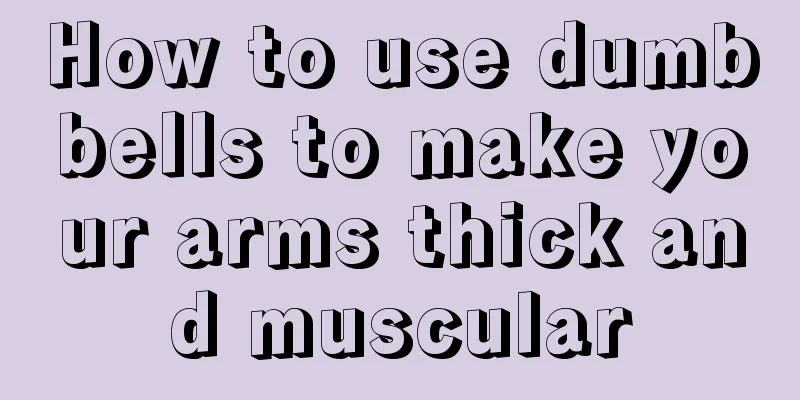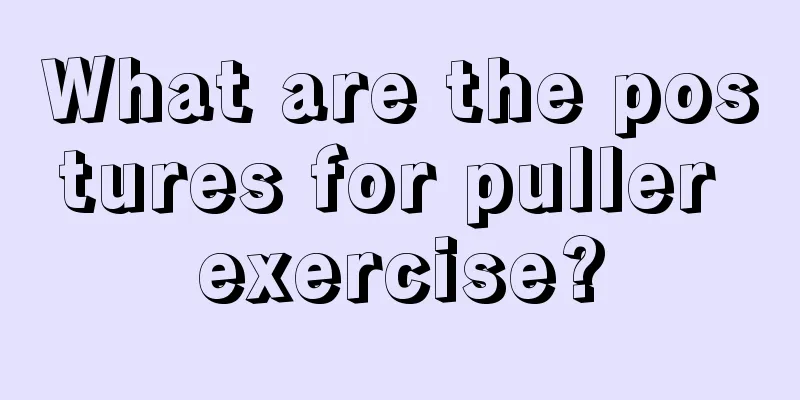How do women exercise their waist?

|
The importance of the waist to us is self-evident. The waists of many people become worse and worse as they age. So how do women exercise their waists? First of all, we need to understand that women are not as strong as men. Therefore, when choosing exercise, we should choose relatively easy exercise. Secondly, we should choose some slightly simpler exercises. Next, let us understand how women can exercise their waist? Waist exercises generally involve loosening the hips, turning the waist, pitching and other movements to unblock the qi and blood in the waist. Chinese medicine experts here recommend six movements to unblock the qi and blood in the waist, which you can try. 1. Bend forward and stretch backward Stand with your legs shoulder-width apart, hands on your hips, and then steadily flex and extend your waist 5-10 times each. Try to relax your waist muscles when exercising. 2. Alternate tapping Stand with your legs shoulder-width apart, legs slightly bent, arms hanging naturally, and hands half-clenched. Turn your waist to the left first, then to the right. At the same time, the arms swing naturally back and forth as the waist turns left and right, and using the force of the swing, the hands tap the waist, back and lower abdomen alternately, one front and one back. The amount of force can be determined as appropriate. Do this for about 30 times in a row. 3. Hip rotation Stand with your legs slightly wider than your shoulders, put your hands on your hips, and regulate your breathing. With the waist as the central axis, the hips first make horizontal rotation in a clockwise direction, and then make the same rotation in a counterclockwise direction, with the speed increasing from slow to fast and the amplitude of rotation from small to large. Repeat this 10 to 20 times. Make sure your upper body remains basically upright, your waist moves with the rotation of your hips, and your body does not lean forward or backward excessively. 4. Arch Bridge Lie on your back in bed with your legs bent. Use your feet, elbows and the back of your head as fulcrums (five points of support) and lift your hips up like an arch. As the exercise progresses, you can place your arms in front of your chest and use only your feet and the back of your head as fulcrums (three-point support) to exercise. You can exercise 10-20 times each time. Patients with cardiovascular and cerebrovascular diseases should practice this exercise with caution. 5. Hands Reaching Feet Stand upright and relax your whole body, your legs can be slightly apart, first raise your arms, then lean your body backward, try to lean back as far as possible. Pause for a moment, then bend forward and move your hands down until they can touch your feet as much as possible, then pause for a moment and return to the original position. This can be done 10-15 times in a row. Note that when you bend your body forward, your legs should not be bent, otherwise the effect will not be good. The elderly or patients with high blood pressure should bend more slowly. 6. Waist Protection Exercise Stand with your feet shoulder-width apart, and place the backs of your hands on the two kidney points on the lower back (below the transverse process of the second lumbar vertebra, about 4.5 cm away from the midline of the back). While regulating your breathing, walk forward slowly with your feet. Taking the right foot forward as an example, when the right foot is in front, the heel is on the ground, and the toes are raised, the waist and hips should be relaxed, and the front of the body should be slightly tilted to the right front. The method to coordinate with breathing is: when the right heel is on the ground and the toes are raised, do two "inhale" movements in a row. The center of gravity of the body slowly moves to the right leg and right foot. When the center of gravity falls on the right foot, keep the foot flat, touch the ground with the left toe, and lift the heel. When turning to face the left and rear, make an "exhale" movement. When practicing this posture, "inhale" slowly and "exhale" even slower. After finishing breathing, turn your body forward to return to its original position, using natural breathing methods, and never hold your breath. “Inhale” – “Inhale” – “Exhale” – “Plain”. "Ping" means returning to the natural breathing state, which can also be called "rest". Breathe continuously according to the above breathing process, practice repeatedly, with 9 breathings as a round. After completing a round, take a break and then do it again. Return to a relaxed standing position and the exercise is complete. How do women exercise their waist? The above is the answer to this question. It is still necessary for us to exercise the waist. On the one hand, it can strengthen our body. Secondly, when we get older, some diseases will occur in the waist, which will prevent us from living a normal life. I think this is unacceptable to us. |
>>: How do girls exercise their chest muscles?
Recommend
What are the benefits of hot yoga?
Hot yoga is now a form of yoga exercise that is l...
How to quickly train to grow muscles
If we want to have a healthy body, we need to exe...
Can anyone practice yoga now?
Nowadays, as more and more people want to achieve...
How to practice yoga well?
After get off work, many female friends choose to...
How to maintain healthy exercise
To stay healthy, you need to develop good living ...
What are the causes of muscle soreness during exercise?
Many friends who don’t exercise much will have se...
How long do muscles need to rest?
Muscles are tissues that most living things posse...
Can I drink water before doing yoga?
Practicing yoga has become a very popular sport a...
How to do yoga for weight loss after pregnancy
It can be said that every young mother hopes to r...
I feel exhausted after doing it, but why is there no effect at all?
"I exercise, but why can't I lose weight...
What to eat after fitness to gain muscle
After fitness, the body consumes a lot of energy,...
Outdoor Classroom: Preparations for Long-distance Hiking
Long-distance hiking refers to hiking activities ...
How to do the basic yoga hip lift?
Nowadays, many women like to achieve body shaping...
What are the benefits of sweating during exercise?
The reason why many people like sports is that sp...
What are the abdominal muscle fitness methods?
I believe that having some perfect abdominal musc...









